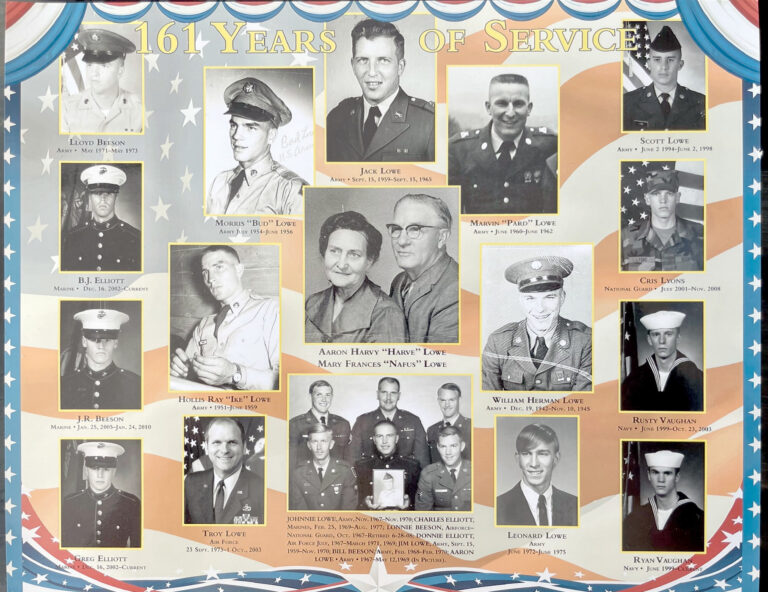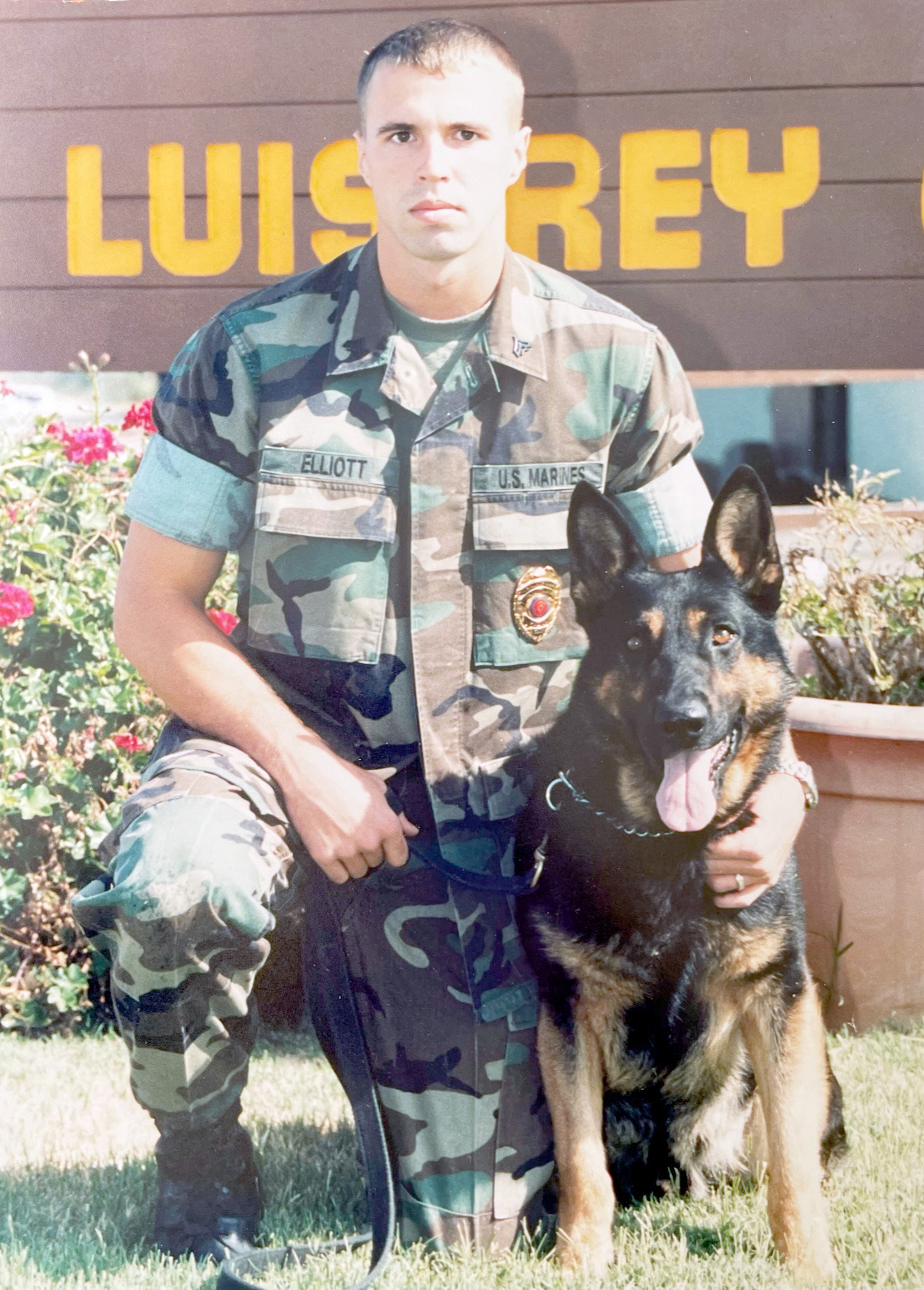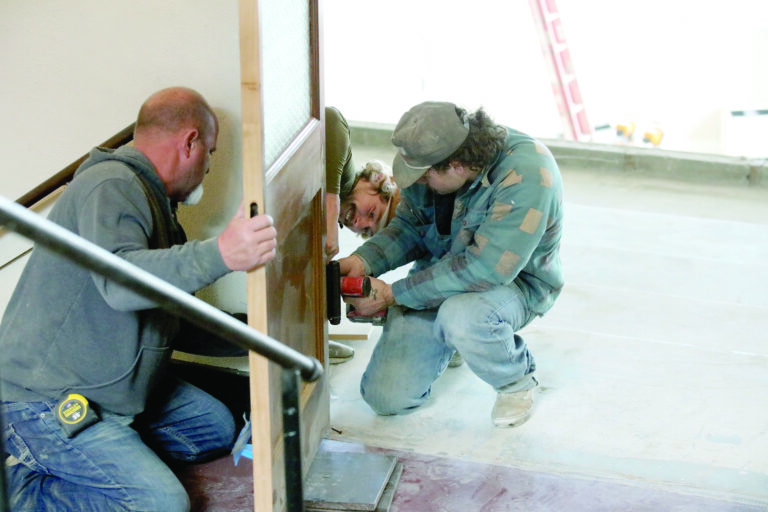Surrounded by service


Elliott’s upbringing spurs nearly 20 years in Marine Corps, Army
By Kyle Troutman [email protected]
Surrounded by so many family and friends who were veterans, Benji Elliott, of Shell Knob, knew early on he wanted to be involved in the military.
Elliott was not even out of high school when he put his name on the line for his country, enlisting in 1997, his junior year at Cassville High School, and training monthly in Springfield.
By the time he was 19, Elliott was halfway around the world.
“Growing up, there was no defining moment that made me enlist,” he said. “I think it was a culmination of how I was raised and having so much extended family in the Barry County and Cassville areas, many of the veterans. The people I was raised with, their dads were veterans, too. They’d been in WWII, Korea, Vietnam [and more]. Aaron Lowe died in Vietnam and is on the wall, and Troy Lowe had 30 years in the Air Force and was a master sergeant. My dad’s best friend and his wife were both in the Air Force, and even my baseball coach was special forces in Vietnam.
“That environment I was raised in gave me a sense of patriotism, and I’d hear stories and see how these people conducted themselves. That pushed me to do the same thing.”
Elliott began his service as a K-9 MP, an explosive narcotics dog handler. He trained in California, Alabama and Texas before being stationed in Okinawa, Japan, at the age of 19, one of only 87 K-9 MPs in the military.
“From there, I went to Camp Pendleton in California and finished my first tour in 2002,” he said. “September 11th had just happened, and I began working with the secret service as part of Homeland Security doing searches of locations where the president would be visiting. that was pretty neat. We got to wear suits and really felt like someone.”
After September 11th, Elliott was steered toward the sky marshal program, and if not accepted, he planned to re-enlist and fight in the War on Terrorism in the middle east.
“At about 3:30 a.m. one morning I got a phone call while I was on duty asking if I was interested in being a marshal,” Elliott said. “I left the Marines in March 2002, and in April, I went to the air marshal academy. That was a big deal because of hijackings and everyone wanting more secure flights. I felt as marshals we spearheaded the War on Terrorism.”
For three years, Elliott flew across the world as a marshal, which he said made him feel patriotic and proud. In 2005, still in the Reserves, Elliott began taking contract work as an explosive dog handler in Iraq and Afghanistan.
In 2008, Elliott fully re-enlisted with the Marine Corps with the goal of becoming an aviator. That dream, however, was met with turbulence.
“I was in college for that starting in 2009, but the Marine Corps downsized in 2011 and changed some age restrictions,” Elliott said. “I was 30 or 31 when they lowered the maximum age of an aviator to 33, then they dropped it to 28 and I became ineligible.”
Frustrated with the change, Elliott said his superiors went to bat for him trying to obtain an exemption, but the brass held firm.
“My colonel told me about being a warrant officer in the Army and that I could fly that way, so I put a package together for that and was selected in 2012,” he said. “During flight school, I had a medical issue that disqualified me from flying for the military, though I could still fly private or commercial. At that point, the Army did not know what to do with me because of my K-9 background, so they stuck me in the admin world in aviation. I did lots of trainings there. I was medically separated from the Army in 2016.”
Following his military career, Elliott ventured into other federal employment, working for the Veterans Administration as a field investigator from 2016-2018, working in North Carolina and Iowa.
“There, I got to meet one of the last remaining Tuskegee Airmen, and I primarily worked with veterans unable to handle their benefits, helping them pay bills,” Elliott said. “I also did a lot of fraud investigation. At one point, I met a veteran that was at Iwo Jima — he was like walking history. Out of everything I’ve done, I think that work was the most rewarding.”
Since leaving the VA, Elliott has been working for his uncle’s construction company in Barry County.
He said through all his experiences, he has enjoyed witnessing and learning about different cultures across the globe.
“Japan was a culture shock for a 19-year-old, but it was a lot of fun,” he said. “I worked a lot — 24 hours on, then 24 off, then training and repeat. Our K-9 unit was in charge of all nine bases on the island. When I left the Marines in 2002, I sold back 87 days of leave because I just wasn’t able to take them.
“But, it was all worth it. I had a lot of great experiences, like visiting Mt. Fuji. You get a stick at the bottom and at each stop on the way up, a stamp is burned into the stick, then when you reach the top, you get a red stamp at the top of the stick.”
As a federal air marshal, Elliott said he was able to fly to nearly every state in the union, and he spent time in South America and Europe.
“I went to quite a few places in South America, but flying in the State was a lot of fun because I’ve been to just about every state and was in the big cities everyone wanted to visit,” he said. “[Internationally], you see a lot of different cultures. Britian has horrible food, but I also got to go to places like Puerto Rico and Hawaii; never Alaska, but I do want to go there one day.”
Elliott said one of the biggest differences he noticed in other countries was the simplicity of life compared to the U.S.
“Some places are very simple, and in places like Budapest, Hungary, you could be driving a road that looks much like Highway 37 and see ruins from the Roman Empire. It makes you realize how young we are as a country compared to their thousands of years of culture.”
Elliott said those kinds of experiences are what he hopes to pass on to his three children, Charles, 18, Evelyn, 16, and Benji, 14.
“I try to instill in them to be open-minded because the world is not just how you were raised,” he said. “There are a lot of different things you can experience, and some of that can be shocking. Life can be very different for everyone, and it’s what you want to get out of it. I’ve been accomplished, but I’ve failed even more. You just have to pick up and try again.”
Elliott said for young men or women considering the military as a career, the best advice he could give is to push them to ask questions.
“Speak to a veteran — from any era,” he said. “Eras change and the experiences change, but recruiters will sell you on the military. The education benefits are great, but they don’t tell you what it’s like to live it day to day. Try to alleviate the fear of the unknown as much as possible.”
Elliott said the best thing to do is speak to a veteran in the specific branch the individual hopes to enter.
“There are tons of people in the area who have done many different things in the military,” he said. “Take the advice of people around you and ask questions. Veterans do not really like the limelight; they serve for a reason or a purpose. For me, I try to be humble. We don’t gloat or pat ourselves on the back — it’s about serving our communities.
“We are also very approachable, so if a kid wants to speak to us, we will do that. And, we’ll speak with their parents, too. We are always here. The veterans kids see at the school ceremonies are not even half of the ones living in this community.”




